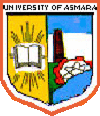University of Asmara
 | |
| Type | Public |
|---|---|
| Established | 1958 |
| President | Tadesse Mehari |
| Location |
Asmara, Eritrea 15°20′33″N 38°55′39″E / 15.34250°N 38.92750°ECoordinates: 15°20′33″N 38°55′39″E / 15.34250°N 38.92750°E |
| Website |
www |
The University of Asmara (UoA) was a public university in Asmara, Eritrea. The nation's first university, it was founded in 1958 by the Piae Madres Nigritiae (Comboni Sisters). The school was meant to provide for the local population, though its initial enrollment in the 1950s was entirely Italian.[1]
History
| Wikisource has original text related to this article: |
The university was founded in 1958, albeit by a different name, the Catholic College of Santa Famiglia.[2]
By 1964, the university had been renamed and began offering Associate Diploma programs in the Arts, Commerce, and the Sciences.[1]
In 1979 the new president pushed through a major reorganization of the curriculum and structure. The next years saw an increase in students from 300 to 2,700. New courses, staff, day and evening extension programs and campus buildings revived the university, together with a bilateral agreement to exchange students and faculty with the University of Addis Ababa, particularly focusing on graduate training in Addis Ababa to produce faculty for Eritrea.[1]
The university stopped new student enrollments in 2002. In 2002, the government issued a directive re-configuring the university and effectively shutting down all of the university's undergraduate programs. Ever since, prospective students (those who score a passing grade on the National High School Leaving Certificate Exam) are directed to one of five tertiary education institutions that opened after the university was shut down.
The Eritrea Institute of Technology is currently the biggest higher education institute in the country.
The Eritrean government's claim that the university was restructured and its resources reallocated to new institutions of higher education in order to grow student population is criticized by many. Critics claim the closing of the university was a political move aimed at growing the government's control on colleges students.